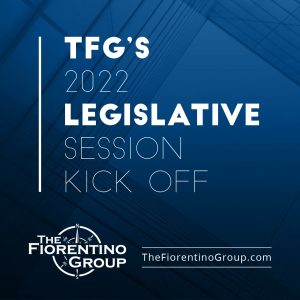
Florida lawmakers convened in Tallahassee yesterday to kick off the 2022 legislative session. The official start followed weeks of preparation, with state House and Senate members periodically holding interim legislative committee meetings beginning last September.
Despite recent New Year celebrations, there is much that still feels familiar – primarily, the ongoing COVID-19 pandemic. Despite this, Florida has fared much better than other states in numerous ways. Governor DeSantis remains steadfast in his commitment to keep the state open for business and support and implement policies that make the most sense for Florida. Last November, the Governor called a week-long special legislative session to address issues relating to federal vaccine mandates, as well as COVID-19 policies and restrictions being implemented by local governments throughout the state. This session, members are keeping the State Capitol open for business while eyeing ways to further policies previously passed that provide protections for health care workers and other businesses against legal actions related to COVID-19.
In terms of topics up for debate over the next two months, the docket is certainly getting full. Despite this being an election year, which typically means members shy away from heavier, more contentious issues, the Governor and other leaders have outlined numerous important policy matters for consideration – some of them controversial. For example, yesterday legislation was filed by Republican members in both chambers to limit the state’s current abortion laws. This issue is certain to cause substantial contention this session.
The Governor recently announced his 2022-2023 budget recommendations and spent the past several weeks rolling out his priorities for the 60-day session. These were highlighted during his annual State of the State Address yesterday morning, where he emphasized that Florida is and will remain a “free state.” In addition to budget recommendations totaling $99.7 billion, the Governor’s objectives for session include sweeping changes to existing state laws.
Senate President Wilson Simpson (R-Spring Hill) and House Speaker Chris Sprowls (R-Clearwater) also made opening speeches before their respective chambers yesterday. Both Simpson and Sprowls are in the second and final years of their leadership terms, and both are certain to have substantial legislative objectives for session. Last session proved to be fairly harmonious between leaders. Hopefully, the process will go as smoothly this year since it’s an election year.
In addition, this session both chambers are tasked with redrawing Florida’s state legislative and Congressional district maps – a monumental effort known as redistricting. With steady population growth in recent years, Florida will gain one Congressional seat this year, going from 27 to 28 seats. This issue will be key as we move closer to the 2022 elections this fall.
Leadership
Governor DeSantis has worked tirelessly throughout his time in office, taking very little time off. Despite the difficulties of the past two years, he has proven himself to be one of the strongest leaders in state history. Last month, the Governor announced his budget recommendations for the coming year, which are nearly $2 billion less than the current budget.
Last session was an overwhelming success for the Governor, with his policy and appropriations priorities successfully passed by lawmakers. This year, the Governor is making a strong push for continued election reforms, including the creation of a state office to investigate election-related crimes. The Governor also remains focused on education, calling for increased spending as well as changes to education policy – particularly, prohibiting the teaching of Critical Race Theory in the state’s public schools.
One big issue for the Governor is combatting immigration policies being implemented by the federal government. Another is maintaining law and order and protecting Florida’s police forces. The Governor is calling for increased salaries and bonuses for the state’s law enforcement officers, as well as increased funding for the Florida National Guard and the re-establishment of the Florida State Guard – a military guard set up during World War II when members of the Florida National Guard were deployed.
The Governor is also keenly focused on providing relief for Floridians against inflation and the rising costs of basic goods and services. One of his biggest priorities this session is a temporary suspension of the state gas tax to help Florida consumers with ever-increasing gas prices.
On the Senate side, in his opening remarks to the chamber yesterday, President Simpson called for increased investment in the state foster care system, as well as pay raises for law enforcement officers – a top priority of Governor DeSantis. Simpson is also supporting a controversial measure this session filed by Senator Travis Hutson (R-Palm Coast) that would allow private businesses to sue local governments in instances where local government policies caused profit losses for the business. While supported by business groups, the legislation is heavily opposed by local governments and their organizations throughout the state. This will likely be a contentious issue this session.
President Simpson also recently expressed interest in revisiting legislation passed by lawmakers last year to end the state’s no-fault insurance system. While that bill passed through the 2021 session, it was ultimately vetoed by Governor DeSantis. In addition, Simpson may again attempt to push legislation to move state workers away from the traditional pension system and into investment plans.
On the House side, Speaker Sprowls also addressed his chamber yesterday. While the Speaker did not go into specifics with legislative priorities, he did express that this session would be all about “risk” – particularly, assessing current threats to the state ranging from cybersecurity, to hurricanes, to risks to the values held by Floridians.
State Budget
→ Revenues and Federal Stimulus
Budget and revenue-wise, Florida has fared significantly better than many other states over the past two years. The first year of the pandemic saw Governor DeSantis make a record $1 billion in vetoes to the 2021-2022 state budget passed by lawmakers that year. Since then, however, the state has consistently overperformed and far exceeded revenue projections. That, combined with influxes of federal cash through stimulus plans passed at the federal level, has resulted in a consistently positive outlook for state budget writers.
Last year, lawmakers saw the infusion of around $10 billion in federal relief funds to the state, as well as state revenues consistently coming in higher than projected. The result was a record $101.5 billion state spending plan in 2021 – the first time in Florida’s history that the state budget surpassed $100 billion. Lawmakers ultimately decided to spend about $6 billion of the federal funds and place the remaining dollars into state reserves.
This year, revenues have again consistently outperformed projections. In August, state economists estimated that lawmakers would have more than $2.5 billion over forecasts for crafting a 2022-2023 state budget. In December, revenues were again higher than projected – largely due to sales tax collections, showing that Florida’s economy remains strong.
→ 2022 Spending Priorities
Last month, Governor DeSantis rolled out his $99.7 billion budget proposal. The Governor’s plan keeps with the use of federal dollars for key programs and continues his commitment to invest in Florida. The plan calls for boosts in education spending – $1.1 billion over the current budget – as well as increased spending on workforce education programs. In addition, the Governor calls for spending federal stimulus dollars to provide another round of bonuses for teachers in the amount of $1,000, as well as continued funding for increasing teacher salaries. On the higher education front, the Governor’s plan decreases spending for state universities by $100 million and calls for no tuition increases for Florida’s public college and university students. The plan does, however, fully fund the Bright Futures Scholarship Program, which provides scholarship funds for students based on academic achievement.
Environment and water issues have consistently been a major priority for Governor DeSantis who, upon taking office, committed to providing a total of $2.5 billion in environmental spending over his first four-year term. This year, the Governor maintains his commitment, with nearly one billion allocated for environment and water programs, including Everglades restoration.
On the economic development front, the Governor wants to build on Florida’s growing economy by doubling funding for the state’s Job Growth Grant Fund, as well as providing continued funding for Visit Florida, the state’s tourism marketing agency. One of the biggest components of the Governor’s plan is the utilization of federal funds for a five-month suspension of the state’s gas tax, which will help consumers during this time of steadily rising gas prices.
In addition to his spending plan, the Governor’s recommendations also call for placing $15 billion into reserves to continue building savings for the state.
Noting the unprecedented influx of federal dollars to the state, last week the Governor expressed that this year will likely be the best year to seek funding for local projects. This shows promise for receiving state funding, not only through the session process, but also during the post-session veto period. At this time, there have been more than 1,600 appropriations requests filed in the House, and more than 1,000 in the Senate.
Legislative Initiatives
→ Education
Governor DeSantis has consistently expressed his support for increased K-12 funding. There has been considerable success in recent years, given his push for increased teacher salaries, as well as school choice and voucher programs.
Last year, the Governor saw successful passage of a measure requiring school civics curriculum to include teaching about the U.S. Constitution and other aspects of American liberties and citizenship. After last session wrapped up, the Governor supported a proposed rule to remove Critical Race Theory (CRT) from all teaching in Florida schools. This year, the Governor is looking to take the issue a step further, supporting legislation to allow parents to sue schools where CRT is taught, and allowing for the recovery of attorney fees in those situations.
Last September, the Governor announced the complete elimination of the Florida Statewide Assessment (FSA), the state’s standardized test for students. This session, the Governor is looking to provide more than $15 million to fund the creation of a replacement program and move school accountability from standardized testing to “progress monitoring.”
Last week, a Senate measure was filed to place a constitutional amendment on the ballot to require eight-year term limits for school board members throughout the state. This proposal has been considered in previous sessions without successful passage, but given the recent contention between state lawmakers and school districts, many believe the issue may gain more steam this year.
→ Elections
In the final days of last session, lawmakers agreed on legislation to overhaul Florida’s election procedures – placing expanded restrictions on voting by mail, particularly the use of “drop boxes” for voting.
This year, Governor DeSantis is looking to take the issue even further, calling for the creation of an Office of Election Crimes and Security to crack down on crimes relating to voting and elections. The Office will be particularly focused on ballot harvesting, where ballots are collected and submitted by third-party individuals rather than voters themselves.
→ Environment
Environmental issues have had high priority over the past several years, with resiliency being one of the most critical topics addressed last year. This session, there will be several legislative proposals up for discussion and debate among lawmakers.
In 2019, legislation was passed to create a state Blue-Green Algae Task Force to address and resolve water quality issues throughout the state. This year, lawmakers are considering measures to implement recommendations of the task force. Senator Aaron Bean is also pushing legislation to allow the Governor to appoint a secretary to the Florida Department of Environmental Protection (DEP) without needing the approval of the Cabinet.
→ Health Care
Florida lawmakers are considering legislation to extend last year’s legal protections against Covid-related lawsuits for the state’s health care providers. The 2021 bill is set to expire at the end of March. This year’s legislation would extend the protections to June 1, 2023.
One of the biggest and potentially most controversial issues this session will surround the topic of abortion – an issue being debated nationwide and currently being decided by the U.S. Supreme Court. As session kicked off yesterday, bills were filed in the House and Senate to prohibit abortions from being performed in Florida after 15 weeks gestation.
→ Immigration
One of the biggest efforts for the Governor and other state leaders this session will be combatting controversial immigration policies being implemented by the federal government. There are many components to the legislation filed recently in both chambers and supported by the Governor. Much of the issue surrounds the practice of federal officials bringing late-night flights of undocumented immigrants into Florida cities. The legislation would extend the previously passed ban on sanctuary cities in Florida and expand the state’s E-Verify requirements. Under the legislation, companies that aid in the transportation of undocumented immigrants into Florida would be banned from contracting with Florida’s state agencies and local governments.
→ Transportation
Lawmakers in both chambers will consider comprehensive transportation packages this session, which typically outline the Florida Department of Transportation’s (FDOT) legislative priorities for the year, and include matters relating to the state’s roadways, airports, and seaports, among other issues.
Key for state transportation policies going forward will be the infusion of billions of federal dollars – nearly $17 billion over the next five years – into state projects and programs. These funds will be utilized for various projects including highways, bridges, airports, seaports and railroads. At this point the state is awaiting guidance and clarification from federal officials on exactly how the funds can be utilized and what will and will not be allowable going forward.
Going Forward
There is much to be decided and much at stake in the legislature in the coming months, with critical state policy and funding issues up for discussion. As of this writing, members have already filed more than 3,500 policy and appropriations bills for consideration this session. The number of those substantive bills that will actually be heard and moved through the process, however, will be much smaller. Typically, only about 200 policy bills pass completely through the legislative process by the time session wraps up.
The 60-day session is scheduled to conclude on Friday, March 11th.
Once session adjourns, state headlines will almost immediately shift to the coming 2022 elections.

